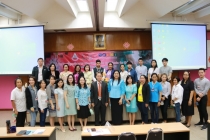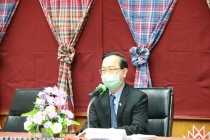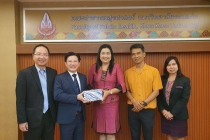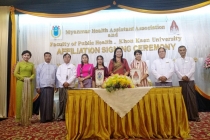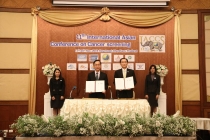Prof.Tony Hsiu His Chen, a president of IACCS Network, said providing health service and health screening to the people is a main responsibility of the public health system in any country. National Taiwan University is outstanding in working with the public to promote the people health. Professor Chen was delighted to be able to work with KKU to share his expertise to the allies from Thailand. He was optimistic that the MOU would help increase the number of new face researchers on cancer screening, promote research publication and innovation on the area. The success on these areas would be dispersed to other ASEAN countries, said Professor Chen.
This conference was meant to shine a spotlight on the silent danger of colorectal cancer whose number is proliferating every year. Based on the screening experiment in Namphong District, the rate of cancer frequency in the area was rated at 7 %. Having effective tool for cancer screening is another measure to increase the patients rate of survival since some type cancer is curable when observe at early stage. Since most cancers’ early development goes without symptom, the patients usually visit doctors when the disease reaches a brutal stage. To prevent colorectal cancer, a large number of people, especially the risk group of above 45 years old, are advised to attend the screening. Fit is a device used for checking level of hemoglobin in the sample’s feces. A cancer positive when the hemoglobin level reaches 100 and above, which is a sign showing that the patient might have higher risk, but not definitely, of cancer. Repeat screening by means of colonoscopy should be performed to really dictate the result of cancer screening. Colorectal cancer takes 10 years to be active, having been diagnoseKKU Faculty of Public Health together with National Taiwan University and Taipei Medical University held a tripartisan international conference: The 11th International Asian Conference on Cancer Screening (The 11th IACCS) between 17-20 November, 2019 at The Kosa Khon Kaen Hotel. The conference discusses ideas on cancer screening issues and research collaboration in the Asia-Pacific region.
The four-day conference was scheduled with many activities such as research presentations and showing condolence to late Professor Supannee Promtet, a former teacher at Department of Epidemiology and Biostatistics, Faculty of Public Health of Khon Kaen University. The late professor was well respected in the epidemiology research area and was an influencing member of the conference. Another activity endorsed during the conference was the signing of memorandum of understanding between the cancer hospitals under the Ministry of Public Health and the ASEAN Cancer Epidemiology and Prevention Research Group from the Faculty of Public Health of Khon Kaen University. The MOU was signed by Assoc. Prof. Charnchai Panthognviriyakul (MD.), an acting president of KKU, and Doctor Somsak Akkasilp, a director general of Department of Medical Services. On November 20, the last day of the conference, the participants visited the Cancer Center of Laos PDR in Vientiane.
Assoc. Prof. Dr. Phongdet Saragarn, a head of ASEAN Cancer Epidemiology and Prevention Research Group, said that the conference was well collaborated by National Taiwan University, Taipei Medical University and Asst. Prof. Patarawoot Watanasap, a doctor from Otolaryngology Department of KKU’s Faculty of Medical Sciences. Under the six-year term collaboration, the parties have been collaborating in wide variety of areas including; exchanges on cancer screening research, pedagogical collaboration. More recently, the group has conducted an experiment relating to the screening of colorectal cancers in Banphai, a district about forty kilometer off from the city of Khon Kaen. The experiment was set as a prototype of the study of its kind which will be expanded to other ASEAN countries. So far, the cancer screening system developed under this project has been shared to Vietnam via doctoral degree research completion of a Vietnam student who conducted a research on cancer screening in his home country.
A lot of advantages are attained by collaborating with National Taiwan University who is reputable for having professional researchers on cancer screening and the treatment of non-communicable disease (NCD). This collaboration makes it easier for the researchers under the program to apply for research monetary support and increases the chance to work with other universities around the world via networking with National Taiwan University.
Doctor Somsak Akkasilp, a director general of Medical Service Department, said there are 7 cancer hospitals across the country. Despite the fact that these hospitals are hubs of data on cancer screening and treatment, the deployment of these information is deemed minimal. By entering the MOU with Khon Kaen University’’s ASEAN Cancer Epidemiology and Prevention Research Group, and ACEP research group, the performance on cancer screening and treatment should be escaladed. The collaboration is believed to help finding the better methods for the prevention, the diagnosis and the treatment of cancers. AI should be deployed to help reduce the problem related to the lack of professional evaluators of cancer screening results while AI is known for being higher accurate than human. As a result, the patients can receive faster treatment, an early diagnosis and treatment of cancer is crucial for a higher chance of survival among the patients.
d as this cancer positive at its non-reaction period increase much higher chance of treatment success. People above forty-five and experiencing perennial bloating might need to visit a doctor while regular physical should be performed annually for this group of people.
News: Chutinan Panjarung
Photos: Natapong Chamnan-ua and KKU Public Communication Network.
Link : https://eng.kku.ac.th/6240

